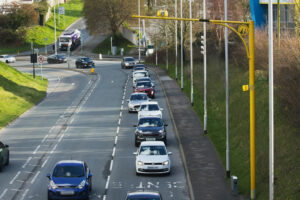Glasgow City Council has started a public consultation on a new transport strategy that sims to help a modern, resilient and sustainable transport system for the city.
Transport accounts for a third of the carbon emissions produced by the city and with Glasgow aiming to become carbon neutral by 2030, major changes are required to how people get about the city if the net zero target is to be achieved.
But with transport also directly linked to health inequality, deprivation and economic performance, the new transport strategy will be integral to the success of Glasgow and its citizens over the next ten years, said the council.
A transport policy simulator has been created which will allow people to allocate points to the issues that matter to them and help create a picture of the city’s priorities.
Councillor Anna Richardson, City Convener for Sustainability and Carbon Reduction, said the input of city residents is essential to keep the strategy heading in the right direction for Glasgow
Councillor Richardson said: “A modern, resilient and sustainable transport system is at the heart of any successful city, and Glasgow is no exception. How easily we can move around the city is of fundamental importance to people as it affects where we live, our life chances, our health and our overall climate.
“The transport strategy will be key to how we move ahead as a city and will direct the investment that will help improve our environment, tackle inequalities and support the economy. There will be difficult choices to be made but the consultation document sets out the challenges the city cannot afford to ignore.
“The choices made as part of the development of the new transport system will have a direct impact on Glasgow and the people who live here for many, many years to come. It is in interests of everyone with a stake in the future of the city to join the public conversation and have their say on the transport strategy. “
The public conversation will inform three distinct plans – a Glasgow Transport Strategy for the overall city, a City Centre Transformation Plan and a new Liveable Neighbourhoods Plan.
Policies will be created in support of these three plans with four major themes put forward for discussion – priority for people, not vehicles; better, cheaper integrated transport systems; people friendly, inclusive neighbourhoods and city centre and cleaner and low carbon transport.
The aim of the overarching Glasgow Transport Strategy is to achieve four major outcomes:
*Transport contributes to a successful and just transition to a carbon neutral, clean and sustainable city.
*Transport has a positive role in tackling poverty, improving health and reducing inequalities.
*Transport responds and contributes to continued and inclusive economic success and a dynamic, world class city.
*Places are created where we can all thrive, regardless of mobility or income, through liveable neighbourhoods and an inclusive city centre.
About 50% of journeys in Glasgow are less than 3km and only 45% of people believe buses in Glasgow offer value for money, compared to 61% in other large urban areas in Scotland.
























